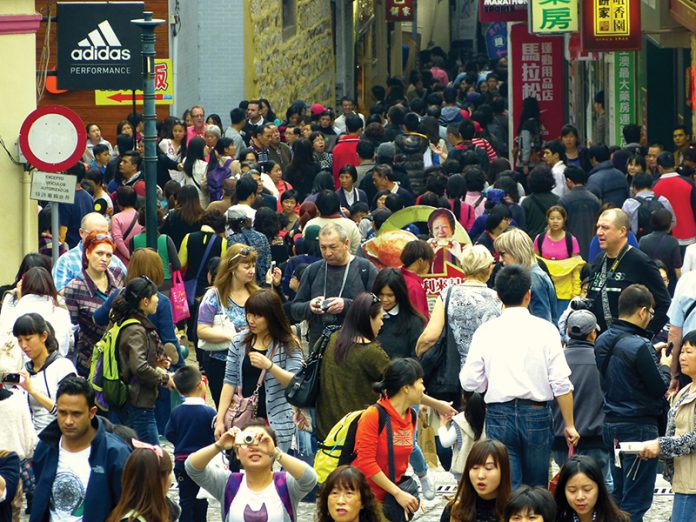Of the 32.6 million tourists who entered Macau last year 10.6 million did so courtesy of the Individual Visa Scheme (IVS).
It is, as we can see, a very high percentage and it can be deduced that the vast majority of these tourists would not be able to come to Macao without the IVS.
If the IVS was created to resolve the economic problems that Macau and Hong Kong were experiencing in 2003, it can be said that the results exceeded all expectations.
“In the first two years of the MSAR Government’s Administration although GDP grew modestly Macau continued to experience economic stagnation, with unemployment ranging between 6.8 per cent and 6.4 per cent,” according to Political Economy of Macau since 1999’s authors (2017).
“As a result of the implementation of the Free Individual Travel scheme in 2003 and the ongoing construction of new casinos Macau’s economy has shown clear signs that it is gradually recovering, and the tourism and casino industries have exhibited remarkable rates of growth,” according to authors Yufan Hao, Li Sheng and Guanjin Pan.
 However, even with restrictions (see text on these pages) more and more tourists are arriving in Macau via this route: if in 2008 they numbered 6.5 million, five years later the figure had already reached 8 million. In 2008, IVS represented just over 25 per cent of the total, while today this figure exceeds 33 per cent.
However, even with restrictions (see text on these pages) more and more tourists are arriving in Macau via this route: if in 2008 they numbered 6.5 million, five years later the figure had already reached 8 million. In 2008, IVS represented just over 25 per cent of the total, while today this figure exceeds 33 per cent.

Another relevant fact: these tourists are big users of the casinos. In fact, a Polytechnic Institute of Macau study reveals that half of these visitors will gamble, and that those spending more than MOP2,000 represent 50.5 per cent.
Even more than Hong Kong, IVS has changed the history of Macau.
“The miraculous expansion of the gaming industry and the flood of revenue from gamblers have changed Macau from a sleepy fishing village to a city of wealth and splendour,” said the team led by Professor Yufan.
“Macau’s post-colonial economic miracle is mainly due to its gaming liberalisation for foreign investors in 2002 and China’s Free Individual Travel Scheme,” adds Tao Li and Li Sheng of the Department of Government and Public Administration, University of Macau.
“As a result of the implementation of the Free Individual Travel scheme in 2003 and the ongoing construction of new casinos Macau’s economy has shown clear signs that it is gradually recovering, and the tourism and casino industries have exhibited remarkable rates of growth” – Yufan Hao, Li Sheng and Guanjin Pan
15 years of history
In 1983, Macau and Hong Kong were the first two destinations Chinese visitors were allowed to travel to. But “this was not truly outbound tourism as the expenses of visitors had to be borne by relatives who resided in Hong Kong and/or Macau,” we can read in The Impact of Visa Liberalization on Tourist Behaviour – The Case of China Outbound Market Visiting Hong Kong (2016).
The Individual Visit Scheme began on 28 July 2003 – “For the first time, people could travel internationally as independent tourists, free from the constraints imposed by the group. The impact was immediate.”
Prior to the Scheme, Mainland residents could only visit Hong Kong and Macau on business visas or on group tours.
The project opened with the possibility of residents of Beijing, Shanghai and Guangdong provinces (Dongguan, Foshan, Guangzhou, Huizhou, Jiangmen, Shenzhen, Zhongshan and Zhuhai) able to apply for visas to visit the two Special Administrative Regions individually.
In 2004, the scheme was extended to all 21 cities of Guangdong Province and to nine other cities in Jiangsu, Zhejiang, and Fujian provinces. In 2005, it was the turn of Tianjin, Chongqing (15 districts and counties), Chengdu, Jinan, Dalian, Shenyang, followed by Nanchang, Changsha, Nanning, Haikou, Guiyang, Kunming and Shijiazhuang, Zhengzhou, Changchun, Hefei, Wuhan in 2007.
In 2008, the restrictions began. While at first a visa permitted two visits per month, in May of that year it was reduced to one visit per month. And a few weeks later to one visit per two months.
Then in the August it was announced that travellers using Macau to reach another destination in China were only allowed to stay in Macau for seven days (as opposed to 14 days) and then in October it announced that only one visit per three months was permissible.
How can we explain these changes?
According to Zhang Jun of Macau University of Science and Technology, “the drastic increase in tourists caused great pressure on the reception capacity of Hong Kong and Macau. Some Mainlanders enjoyed their stay in Hong Kong and Macau to engage in illegal gambling, sex work and illegal work, among other criminal activities.”
By introducing readjustments in the operation of individual visas, says Zhang, “the Central Government intended to ease pressures on tourism in Hong Kong and Macau and maintain the social stability of Hong Kong and Macau.”
























